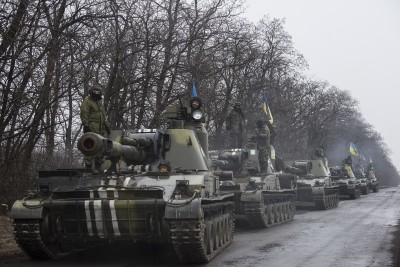OSCE Publishes Report on Russian War Crimes in Ukraine
The OSCE recently presented a report in Vienna on the documentation of war crimes in Ukraine. A delegation of the OSCE saw "clear signs" of violations of international humanitarian law by the Russian aggressor. Detailed elaborations on individual events had not been possible, but some cases of human rights violations could be proven.
 Humanitarian Crisis: OSCE report documents human rights violations and war crimes committed by the Russian army. / Picture: © Wikimedia Commons / OSCE Special Monitoring Mission to Ukraine, CC BY 2.0 (https://creativecommons.org/licenses/by/2.0)
Humanitarian Crisis: OSCE report documents human rights violations and war crimes committed by the Russian army. / Picture: © Wikimedia Commons / OSCE Special Monitoring Mission to Ukraine, CC BY 2.0 (https://creativecommons.org/licenses/by/2.0)
On Wednesday, the Organization for Security and Cooperation in Europe (OSCE) presented a report on Russian war crimes in Ukraine in Vienna.
The report was written by a three-member team appointed by the OSCE. The task of the delegation, which consisted of Wolfgang Benedek of Austria, Marco Sassoli of Switzerland and Veronika Bilkova of the Czech Republic, was to determine whether there were violations of OSCE commitments as well as violations and abuses of international human rights law and international humanitarian law.
It was also to investigate possible cases of war crimes and crimes against humanity, including deliberate and indiscriminate attacks on civilians.
The report describes that a detailed assessment of most allegations of violations of international humanitarian law and findings of war crimes was not possible.
However, the mission found that Russian forces clearly violated international humanitarian law in the conduct of hostilities.
It is noted that had the Russian forces paid attention to their obligations under international humanitarian law, many civilian casualties would have been avoided. The attackers failed to observe the necessary precautions to protect the population. In addition, protected objects such as hospitals and schools were often damaged and destroyed.
Moreover, much of the conduct of Russian forces in the parts of Ukraine they occupied before and after February 24, 2022, including through their proxies, the self-proclaimed Donetsk and Luhansk "republics," violated international humanitarian law regarding military occupation.
However, misconduct by Ukrainian troops has also been demonstrated. Some violations and problems were also found with respect to practices attributable to Ukraine. The Mission is particularly concerned about the treatment of prisoners of war, who were originally considered criminals and were treated in a manner inconsistent with Geneva Convention III.
The Mission has also been concerned with the human rights implications of the current conflict. While it was not able to verify all reported incidents involving violations of international human rights law (IHRL), it found credible evidence that such violations of even the most basic human rights (right to life, prohibition of torture and other inhuman and degrading treatment and punishment) were being committed, mostly in areas under Russia's effective control or by entities under Russia's overall control.
The conflict triggered by Russia's illegal aggression has caused a high level of destruction and affected the provision of vital services (education, health care), making it very difficult for Ukraine to effectively respect, protect, and fulfill the human rights of its residents.
In addition, the Mission has found that while the conflict has affected all residents of Ukraine, it has had and continues to have a particularly negative impact on persons belonging to vulnerable groups, such as women, children, the elderly, or persons with disabilities.
The Mission is not in a position to assess whether the Russian attack on Ukraine should be classified per se as a widespread or systematic attack on civilians.
However, it believes that some patterns of violent acts that violate human rights law and that have been repeatedly documented during the conflict, such as the targeted killing, enforced disappearance, or abduction of civilians, including journalists and local officials, likely meet this qualification.
Any single act of violence of this nature committed in the context of and with knowledge of such an attack would then constitute a crime against humanity.



